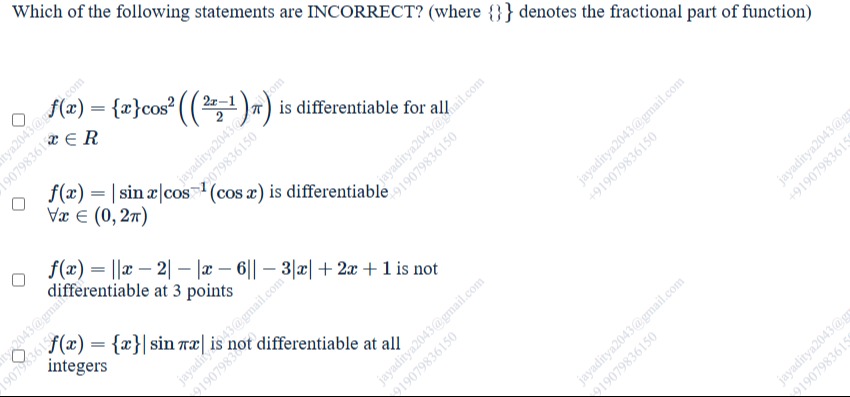Question
Question: Which of the following statements are INCORRECT? (where \{\} denotes the fractional part of function...
Which of the following statements are INCORRECT? (where {} denotes the fractional part of function)
□ f(x)={x}cos2((22x−1)π) is differentiable for all x∈R
□ f(x)=∣sinx∣cos−1(cosx) is differentiable ∀x∈(0,2π)
□ f(x)=∣∣x−2∣−∣x−6∣∣−3∣x∣+2x+1 is not differentiable at 3 points
□ f(x)={x}∣sinπx∣ is not differentiable at all integers

f(x)={x}cos2((22x−1)π) is differentiable for all x∈R
f(x)=∣sinx∣cos−1(cosx) is differentiable ∀x∈(0,2π)
f(x)=∣∣x−2∣−∣x−6∣∣−3∣x∣+2x+1 is not differentiable at 3 points
f(x)={x}∣sinπx∣ is not differentiable at all integers
Statements 2 and 3 are incorrect.
Solution
Solution:
-
For f(x)={x}cos2(22x−1π)
cos2(22x−1π)=cos2(πx−2π)=sin2(πx)
Note thatso
f(x)={x}sin2(πx)Although the fractional part {x} is not differentiable at integers, sin2(πx) vanishes at every integer (since sin(πk)=0); this “kills” the non-differentiability. Hence, f is differentiable for all x∈R.
-
For f(x)=∣sinx∣cos−1(cosx)
cos−1(cosx)={x,2π−x,x∈[0,π]x∈[π,2π]
Recall that the principal value:Also, ∣sinx∣ equals sinx for x∈(0,π) and −sinx for x∈(π,2π). At x=π the left and right derivatives differ (one gets −π and π respectively), so f is not differentiable at x=π even though π∈(0,2π).
-
For f(x)=∣∣x−2∣−∣x−6∣∣−3∣x∣+2x+1
The absolute value functions have potential kinks at x=0,2,6 and the nested absolute value gives another candidate at x=4 (since ∣x−2∣=∣x−6∣ when x=4). A piecewise check shows that the function is nondifferentiable at x=0,2,4,6 (4 points) rather than at 3 points. -
For f(x)={x}∣sin(πx)∣
Here, while {x} itself is non-differentiable at integers, ∣sin(πx)∣ equals zero at all integers. An analysis (using x=k+h) shows that the left and right derivatives at an integer k are different. Thus, f is not differentiable at integers.
Conclusion:
- Statement 1 is correct.
- Statement 2 is incorrect.
- Statement 3 is incorrect.
- Statement 4 is correct.
Therefore, the incorrect statements are 2 and 3.
